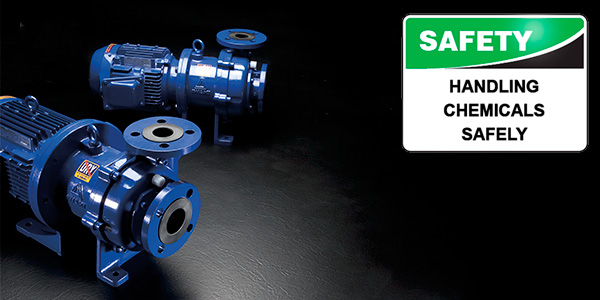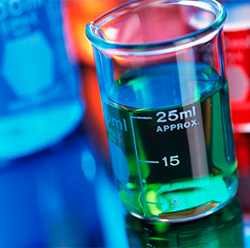Chemicals requiring caution

Good advice on chemical handling
IWAKI have collected some interesting experience on pumps about handling of various chemicals based on more than 60 years in the industry. The considerations include:
- High viscosity-fluids (Sodium hydroxide, sulfuric acid, etc.)
- Fluids with high electrical-insulating properties (Ultra-pure water, inert fluids, etc.)
- Fluids containing slurry (Silica, iron powder, etc)
- Foaming fluids (Hydrogen peroxide, sodium hypochlorite, etc.)
- Fluids that crystallize easily (High salt concentration, etc.)
- Fluids with high permeability (Nitric acid, hydroflouric acid, halogenized hydrocarbon solvents, etc)
- Halogenated chemicals
- Fluids containing corrosive gases (Free chlorine, ozone, etc)
- Fluids that attack flourocarbon polymers
- Low-temperature fluids (Antifreeze, etc.)
- Plating solutions (Gold plating, chrome plating, etc)
Download the Guide ‘Chemicals requiring caution’
Examples from the chemical handling guide
Liquids with electrical insulating properties
Ultra-pure water, inert liquids, etc.

When handling liquids without electrical conductivity, the friction between the liquid and the wet-end parts in fluoroplastics can cause a build-up of static electricity in the pump.
Accumulation of too much electrostatic charge can result in an electrical discharge (spark) in the pump, which can cause damage to pump parts. Therefore, we recommend antistatic precautions during installation.
Note that IWAKI can also supply pump models for the handling of ultra-pure water.
Contact us for more information
Pumping liquids with high permeability
E.g., nitric acid, hydrofluoric acid, etc.
 Fluoroplastics, used in magnetic driven chemical pumps, have a very high corrosion resistance compared to metallic materials. But plastic is also a material which certain liquids may diffuse through, under special conditions.
Fluoroplastics, used in magnetic driven chemical pumps, have a very high corrosion resistance compared to metallic materials. But plastic is also a material which certain liquids may diffuse through, under special conditions.
This must be taken into account, especially when handling nitric acid, hydrofluoric acid, hydrocarbon solvents and other high permeability liquids at high temperatures.
Typical results are:
- Corrosion of the metallic components due to chemical permeation
- Bubbles in the plastics due to chemical permeation
These issues will not result in pump problems in the short term. But the problem will gradually develop and become more critical, depending on the duration and use.
We recommend checking the condition of the pump at regular intervals (3 to 6 months) if the pump handles chemicals with high permeability.